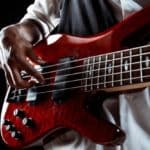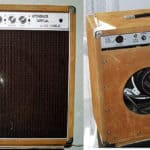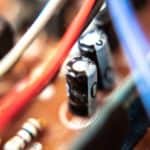When it comes to upgrading your equipment, there’s always the worry of where to start. It’s a big step and no musician takes it lightly, and you shouldn’t.
Upgrading your equipment is a choice to define your style and it comes with a couple of considerations.
A good guitar makes playing much more comfortable and while low-end guitars are still made with care, they just don’t match up to higher-tier gear. The same goes for amps and when it comes to tone, your amp is likely to be the first thing you should look at.
It mostly depends on what you’re wanting to get out of your gear.
Are you going for a better tone or better playability?
In either case, you’re left with a few options for each.
What’s more important for your tone your guitar pickups or your amp?
It’s known that pickups are the single most important piece of your guitar when it comes to getting a good tone.
Or at the very least, they make the most noticeable difference, but no matter how good your guitar sounds, it won’t sound good on a bad amp.
Even a cheap guitar will sound better on a great amp and in my opinion, that should be the first upgrade you look at when it comes to improving the tone of your playing.
The amp really does make a difference.
Now, it doesn’t mean your playing will improve or your comfort will be improved, but your bad playing will sound nicer.
As for your pickups, depending on the quality of your pickups, you might find a great difference in your tone after an upgrade.
Mass-produced pickups may suffer in their quality and deaden some of your playing. Some pickups also aren’t suitable for certain genres.
The case for upgrading your pickups first
My first guitar was a standard Fender Strat model, it came with the three single-coil pickups and that was enough for inexperienced me at the time.
I grew to enjoy playing metal and realized that my single coils just weren’t giving that boost I needed for tapping on the higher frets.
Which pickups you need will depend on your choice of genre and playing style. Humbuckers are great for chugging and tapping, I find single coils are great for blues and warm clean tones.
If you find yourself in the same predicament as I was, I’d recommend either upgrading your pickups or getting a new guitar altogether. Why not kill a few birds with one stone if you can afford it.
Either way, upgrading your guitar from mass-produced to high-end pickups will make a difference in a lot of the warmth and response of your guitar. Generally, more stock-standard parts aren’t considered as good.
The case for upgrading your amp first
In my opinion, your amp will determine most of your tone and playing experience. If your amp isn’t good, it’s going to make any guitar and guitarist sound bad, even if it’s Kirk Hamett playing.
If you’re looking to improve your sound first, I’d recommend getting an amp to start. A good amp will respond more to your playing and make it easier to notice any tonal issues in your guitar (that may or may not be there).
If you’re like most beginners, you bought a small practice amp, but those little guys just don’t give the same response that the bigger amps do.
A higher-quality amp ( I’d recommend a good modeling amp for the best value for money) will respond better to your playing and just make practicing much more fun.
The upside to better amps is that they show you a lot of where you’re going wrong in your playing.
A good amp will often highlight the subtle differences in how you play and make it easier to correct your faults – because you’ll be able to hear them more clearly.
The final reason I’d recommend getting a better amp is because of the versatility of sounds.
Upgrading your pickups may give your guitar a better tonal quality, but it won’t give you versatility like a good amp.
Amps come with a lot of built-in effects and channels, which allow you as the player to experiment a lot and more easily find your sound.
And when you eventually gig, that bigger amp will also allow you to cut out over the noise of everything else like a small amp just can’t.
Alternatives to upgrading your amp
If forking out for a brand new amp isn’t your first choice, there are a lot of other options.
My personal favorite is getting an audio interface that will allow you to play your guitar through your PC.
Digital amps
The benefit of an audio interface is that you can get digital amps; there are a lot of free digital amps to try out, the only downside is that you can’t gig with a digital amp alone.
You can, however, record directly into your PC or play along to practice tracks.
Tabletop Multi-effects
Another option would be to get something like the AMPLIFi TT, which is compatible with any speaker system and provides the effects that you would get out of your standard amps.
The AMPLIFi tabletop modelers come with a lot of different effects that are well-suited for practicing and could theoretically be used on speaker systems for gigging too.
Headphones
While you can’t just plug any old earphones into your guitar jack, there are a lot of products on the market that allow for this option. It’s a lot like a mini-amp, except it comes with earphones attached to the jack with a few small effects options like drive and distortion.
Headphone jacks are best for practice– I wouldn’t recommend them as a viable alternative to amps, but if you’re just looking to practice, then this will do just fine.
Micro/Mini- amps
Last on the list is a mini amp. You may not get volume out of a mini-amp, but a lot of big names make outstanding mini amps that give a great response at low volumes. Some are loud enough to be played in public.
They’re also great for practice if that’s all you need. We recently covered a couple of smaller amps in more detail here:
Other upgrades to take into consideration
There’s a lot more to your guitar than just its sound, or at least you can say that its sound comes from a lot of other parts too.
You can improve the playability of your guitar:
- A better neck will be more comfortable
- A better nut and bridge will give more sustain
- The type of tonewood on your guitar will give different qualities to its sound
And aside from just your guitar and amp, you could look at different effects pedals to overcome some smaller issues on your guitar:
- Sustain pedals for… sustain
- Reverb pedals to give some room to your guitar
- A compression pedal to help unify your volume, especially if you have weak pickups
- A distortion or crunch pedal may pair well with your amp if its effects aren’t too good.
There are a lot of options when it comes to improving your guitar, and some may solve your specific problems better than others.
The neck of a guitar is pretty easy to upgrade because it bolts on and off, but you’ll want to make sure that you get either the same amount of frets or a neck that’s compatible with your guitar body- most stores will advise on this.
If you do a lot of bending and whammy bar playing, your bridge and nut will take a lot of abuse and it may be worthwhile to get an upgrade there. You might even try a floating bridge.
If you find you don’t like the way your fretboard feels, you should consider that when swapping out your neck.
Rosewood and Maple fretboards are the most well-known and both give slightly different responses and tonal qualities to your playing.
As for your amp and effects pedals, well that can expensive pretty quickly, but the great part is they will always be interchangeable with other amps.

Hello there, my name is Ramiro and I’ve been playing guitar for almost 20 years. I’m obsessed with everything gear-related and I thought it might be worth sharing it. From guitars, pedals, amps, and synths to studio gear and production tips, I hope you find what I post here useful, and I’ll try my best to keep it entertaining also.





